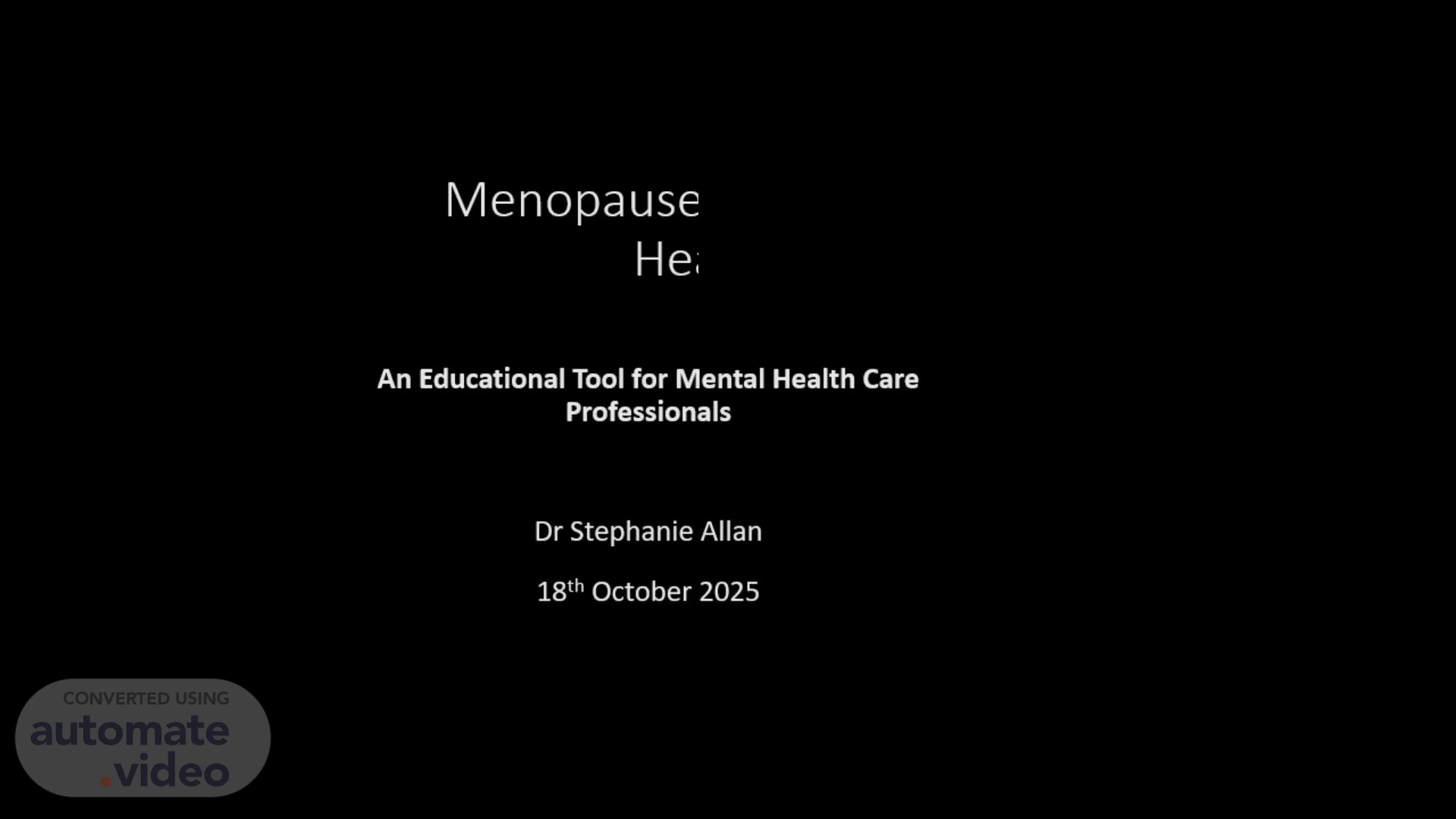Scene 1 (0s)
Menopause and Mental Health. An Educational Tool for Mental Health Care Professionals Dr Stephanie Allan 18th October 2025.
Scene 2 (6s)
What is Menopause?. Biological transition in women (ages 45-55) -Average age 51, younger in ethnic minorities Cessation of menstruation & hormone decline -oestrogen,progesterone, testosterone Perimenopause – up to 10 years prior to final menses Impact of Mental Health Symptoms go beyond hot flushes and night sweats, Mental health symptoms Include low mood, low concentration, poor memory (brain fog), anxiety, insomnia Musculoskeletal (joint aches), vaginal, bladder, reduced libido Bone and cardiac health.
Scene 3 (1m 12s)
Symptoms. breast changes tight muscles Pins and needles poor concentration vert•go symptoms difficulty swollowtng •ncrease tn facial hatr burntng tongue difficulty sleep•nq loss of confidence panful 'Oints vog•nal dryness loss cola sweats erratic blood sugars clammy feeling anxtous indigestion bntlle nads restless legs menopause Signs brain fog ro•sec blood pressure bowel vognal symptoms lock of itbido Irritabii'tV E tearful palpitations lock of focus rajsed penod changes dizz•ness low mood poor dentition Increased aflerg•es dw itchy sk'n acne rosacea electric shock feelings.
Scene 4 (1m 22s)
Estrogen receptors are found throughout the brain and are predominantly ....
Scene 5 (2m 2s)
Oestrogen and Progesterone Receptors. A diagram of the brain Description automatically generated with medium confidence.
Scene 6 (2m 51s)
Menopause and Mental Health. Association with anxiety, depression, and mood swings Emotional symptoms due to hormonal fluctuations (Freedman, 2001) Psychosocial impacts (Woods et al., 2006).
Scene 7 (3m 7s)
Diagnosis. 10 more Krono ovarian hormones through the lifespan.
Scene 8 (3m 37s)
Treatment. High Prevalence of Mental Health Problems during this period-Depression and Anxiety Risk increased during menopause NICE Guidelines for treatment of low mood or anxiety: HRT, Psychological therapies (CBT), Antidepressants if clinical depression - Higher rates in women with a history of mood disorders (Kuehner, 2017).
Scene 9 (4m 33s)
Role of Community Mental Health Teams (CMHTs). Importance of CMHTs: Addressing mental health needs of menopausal women Comprehensive assessments and tailored support HSIB Report Highlights: Integration of mental health services with primary care Aim : to improve the quality of care for women experiencing menopause and to address the mental health challenges.
Scene 10 (5m 25s)
NICE Guidelines on menopause and mental health. Recognition of Symptoms by health care professionals Anxiety, depression, mood swings Comprehensive Assessment Physical and mental health Treatment Options HRT, non-hormonal/antidepressants, psychological therapies Patient Information and Support Clear information about menopause and its potential mental health impacts Holistic Approach MDT: CMHT, GP, Menopause care specialists Follow-Up and Monitoring Monitor symptoms, treatment response.
Scene 11 (6m 56s)
Barriers to Care. Challenges Faced by Women: Stigma surrounding mental health Lack of awareness among healthcare providers (HSIB, 2020) Need for Education and Advocacy.
Scene 12 (7m 18s)
[image]. Conclusion. - Menopause significantly affects mental health - Importance of integrated care and specialized support - Collaborative approach needed for better outcomes.
Scene 13 (7m 37s)
References. - Freedman, R. (2001). Journal of Women's Health & Gender-Based Medicine. - HSIB (2020). Investigation report: Care delivery within community mental health teams. - Kuehner, C. (2017). The Lancet Psychiatry. - Woods, N. F., et al. (2006). Menopause..
Scene 14 (7m 53s)
Smiling Face with No Fill. Thank you.
